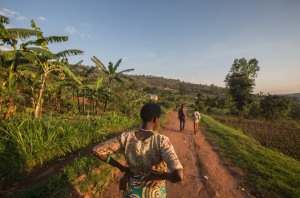In Rwanda, I find myself thinking anew about something which has preoccupied me for the last several years: meaning things. I phrase it to myself as “intention,” and I confess the notion didn’t start to preoccupy me until I became pissed off at how consistently lame men are. I was going through that stage I like to think every woman goes through, where one type of guy seems obnoxiously full of mixed signals, so you change your dating profile, only to have find that Quiet Sexy-Nerdy Boy lacked the same forethought as Short But Handsome Funny Guy. Every woman knows, of course, to stay away from Tall Suave Touchy Guy–he clearly doesn’t mean it–just as she knows she’s making a mistake when she thinks she might be the one to anchor Amiable Upstanding Guy with a Million Female Friends. My only saving grace is that I did, indeed, have the good sense to avoid trying to be anything except his 1,000,001 female friend, a bout of good judgment completely undone by having been the only one stupid enough to become (metaphorically) entangled, for about three minutes, with Tall Suave Touchy Guy.
It’s possible that this stage is all New York’s fault, because that’s where men–really, people–became, well, a problem. New York is nothing but one overpopulated, smelly Mixed Signal. On the subway, we pretend there’s not room to step in, but that’s only because if we take two more steps forward, we won’t get to swipe the seat out from under the old lady getting off at 96th Street. We carry cell phones in large part to break plans we made with no intention of keeping. In bars, we pretend we’re happy to run into Short But Handsome Funny Guy, even though we’re still pissed he didn’t even leave a note in the morning, and we hug the new woman he’s with while simultaneously judging her. She is, usually, funnier and prettier, better dressed and better employed, which means we hate her. Which means we give her a really big hug. We mix signals like they are cocktails at a two-for-one happy hour.
We are a city of liars.
And so, here in Rwanda, I feel off balance. This is a place that demands honesty…and as much as I crave it, I have difficulty offering it. Not the tell-the-truth kind of honesty; I’m not a rampant maker-up of facts. I mean emotional honesty, which implies trust, commitment, and time. The exact opposite of my first inclination, which is to send you a text regretting that I have to cancel our coffee.
If it sounds like I’m talking about dating an entire country, it feels that way, too. There is little middle ground here, in my experience, between being unacquainted and being sudden, deep intimates. Maybe it’s because there are things people feel more comfortable talking to outsiders about; maybe it’s because your average mzungu is here for, like, 3 months, and so if you want to make them your friend, you better do it fast. But people here offer so much of themselves, so quickly, that it makes me nervous.
That’s a lie. (There I go.) It terrifies me.
I am a breaker of plans. I am a hugger of women I envy. I will step into the subway and I will let you have the old lady’s seat, but I will commit to few things and cop to even fewer feelings. I am independent. Or comfortably detached. Or in denial. Depends, I suppose, on your perspective. On, you might say, you’re level of honesty.
Which brings me to my sudden discovery of why (or part of why) I love this place so much: It won’t let me lie. (It dawns on me only now that that’s what I was getting at a few days ago…)
Part of why I’m here is because I want to know the stories of this place, which means being present for the people who tell them. What I’m slowly beginning to understand is that this isn’t just about listening well or staying a few extra hours; it’s about being present completely and constantly, during your conversation and after. It’s about keeping plans when you make them; about seeking someone out simply to say hello; about offering help, and accepting it. It’s about being in people’s lives, not just in their contact lists.
Those are challenges enough for any New Yorker, but the part that really gets me is that being present here requires, also, being vulnerable. There’s little irony here–and, as a consequence, little sarcasm, which I miss a good deal–and the absence of both of these things leaves very little to hide behind.
This is why we’re so good for each other, Rwanda and I. This is a place that demands, as I have come to demand, intention. If you’re going to be here, really be here, you have to show up. You have to mean it.
Sometimes, it exhausts me. Some days I want just to zone out in front of any sort of moving picture and drink a beer. Some days I’m frustrated by the fact that I have learned to listen better, but I have not yet learned to trust more.
And then there are days like today, when I am able to articulate part of that ubiquitous, inexplicable why-am-I-here: because this place is helping me figure out how to be who I want to be.
I realized this recently when talking with a friend. He talked a lot about his mother, a strong and unmistakably straightforward woman who he adored. He lived outside Rwanda before the genocide, with a big family. Most of his biological siblings had gone away to school, so his mother took in some orphans. Twenty-four of them. “She took care of them, and she took the trouble to convince my father to let them stay,” he told me. On weekends, she sent them to fetch water–not for her own house, but for the homes of distant neighbors, members of the only group in the country who were more impoverished and disenfranchised than they.
I don’t know if it was the image of him at home with 27 siblings, or if it was the warmth with which he talked about his mother–he used a word somewhere between “mom” and “mum,” a kind of hybrid vowel that rang with the intimacy of a nickname–but I immediately wanted to know this woman. I wanted to meet a woman so sincere and certain that she took on the rearing of more than two-dozen kids; that she met her husband head on as equal partner, and earned his support for such a seemingly crazy plan; that she taught her children that there is always something to share, even if it is simply the strength you have to lug a gerry can.
It wasn’t the selflessness of all this that impressed me, but the intention. If you’re going to do that, you (and, presumably, your partner) have to show up, all of the time. You have to mean it.
That, I thought to myself, is the kind of woman I want to be.




So…what happens when “comfortably detached” becomes simply “detached”. Or I suppose that’s the point. Detached = without intention and without vulnerability. I’ve had enough of that.
Perhaps that explains the (or my) endemic flying solo chameleon island hopping, morphing into one world and then another. Attached enough to have your own unique intimacy and memories of a place (or person), a relationship between you and that place that’s so far from familiarity, old friends and family that only you and “it” share its secrets. But still safe enough in your transience to move away and on when the story demands any kind of commitment or permanency. But then, once you’ve realized that, how do you stop?
Ok, I’m rambling and not quite sure myself what that means. Just a bit pensive as I say good-bye again to another place. A hopeless civic (or cultural) polyamorist.